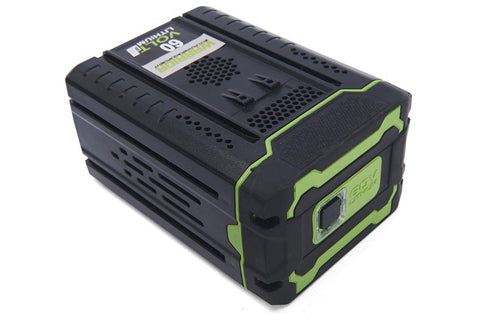Warrior Eco Power Equipment use high quality lithium-ion batteries with Samsung technology for their power source. We strongly suggest you follow the simple guidelines below to extend the life of your batteries.

Most are common sense and when adhering to the guidelines your batteries life cycle will be longer lasting.
Understanding how the Lithium-ion Battery works
The chemistry of the battery - In plain terms how the battery is made, how it produces power and how it stores that power. A lithium-ion battery uses cobalt or iron phosphate as the positive electrode. The negative electrode is generally made from carbon or graphite.
As any other battery it also contains cells made form a chemical called electrolyte which connects the positive and negative. When on charge the lithium-ion battery positive electrode pass on some of its lithium ions which pass through the electrolyte to the negative electrode and remain there. This is then your stored energy or power ready for use when needed.
When you plug in your battery and flick the switch the lithium-ions pass back through the electrolyte to the positive electrode which produces the energy needed to run your unit.
Extending the life of Lithium-ion Battery with proper care
Under normal conditions, there are a combination of factors that can increase or decrease your battery life.
- Avoid subjecting your batteries to extreme temperatures. Exposure to heat is by far the largest factor when it comes to reducing lithium-ion battery life. In the same way that freezing temperatures can cause irreversible problems. Store the batteries in the house during cold winters and avoid leaving them in very hot conditions in summer.
- Try to avoid fully charging on a constant basis. Charging to 80% and removing the battery can extend the life cycle. Remember it only takes 40 minutes for a full charge. The last 20% can be done whilst setting up your unit ready for use.
- Avoid fully discharging the lithium battery when in use. Always try to recharge before the power completely runs out. Except for one exception - see point 4.
- Experts recommend fully discharging your battery after 30-40 charges. Continually partially discharging your battery can create a condition known as digital memory. This decreases the accuracy of the batteries power indicator. To avoid this let the battery discharge completely and then recharge. The power indicator should then recalibrate itself.
- Investing in a second battery can extend the life of both. Avoiding full charge and discharge as pointed out above.
- During the winter months if the battery is not going to be used for a long time. It is recommended that you store the battery in the house rather than a cold garage. Always charge the unit to around 40%, never store a fully discharged battery.
Following these simple steps can prolong your Lithium Battery. Lithium-ion batteries have greatly improved over the last few years and are far superior to previous types of batteries. By following the guidelines you should avoid problems and expect more than 500 charge/discharge cycles from your unit.
Some Important Safety Information to further protect your Battery
For your safety and the correct use, including the maintenance and the storage of the unit, it is very important that you read and adhere to the points given below.
To avoid serious injury, risk of fire, explosion and danger of electric shock or electrocution:
- Do not probe or prod the charger pack with conductive materials.
- The charging terminals hold 120-240V. Never use any other voltage.
- If the battery pack outer case is cracked or damaged in any way, DO NOT insert it into the charger. You must replace the battery pack.
- Do not charge the battery packs with any other type of charger.
- Never allow liquid to get inside the charger.
- Do not try to use the charger for any other purpose than charging the specified unit.
- Do not disassemble the battery.
- Keep away from children.
- Do not expose the unit to water or salt water, and always store the battery pack in cool dry place.
- Never place the battery in high-temperature positions, such as close to a fire or heater or direct sunlight.
- Under no circumstances reverse the positive terminal and the negative terminal of the battery.
- At no time must you bridge the positive terminal and negative terminal of the battery to with any metal objects.
- Do not bang, knock, drop, strike, or put pressure on the battery.
- Do not solder directly onto or near the the battery unit.
- Never pierce the battery with any sharp object. Store away from objects that could fall on and damage the case.
- In the event that the battery pack leaks and the leaking fluid gets into your eye, avoid rubbing the eye and rinse well with water*.
- Immediately discontinue use of the battery if the battery emits an unusual smell feels hot, changes colour, changes shape, or appears abnormal in any other way.
*If the battery fluid gets in your eyes, flush immediately with clean water for at least 15 minutes. Then seek immediate medical attention.
Further points To avoid risk of fire, electric shock, or electrocution
- Avoid using a damp or wet cloth and never use detergent to clean the battery or battery charger.
- Always take the battery pack out of the charger before cleaning, inspecting, or taking out any general maintenance on the unit.
- Do not charge the battery pack in rain or in wet conditions.
- Do not immerse the battery pack unit or charger unit in any water or other liquid.


